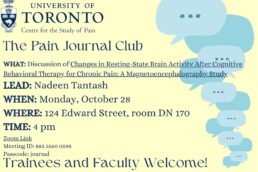Non-pharmacological Skill-Based Invention as an Alternative to Reduce Opioid Use in Chronic Pain
Opioids are often used to treat non-malignant pain. However, it has been suggested that opioids are not any more effective than non-opioid treatments and could potentially be harmful in the short- and long-term.
June 29, 2023Researchchronic pain,randomized clinical trial,alternative pain treatments,opioids
UTCSP Translational Seminar Series with Dr. Tasha Stanton
Dr. Tasha Stanton, Associate Professor in Clinical Pain Neuroscience, from University of South Australia, speaks on advances in exercise-based virtual and mediated reality for chronic pain. Part of our UTCSP Translational Seminar series.
May 4, 2023Past Eventchronic pain,translational seminar series









